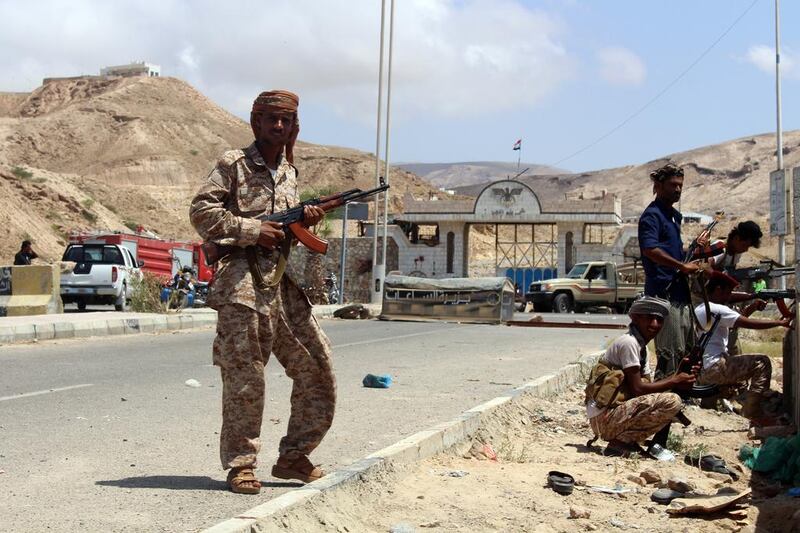An ironclad rule of politics is that success brings money and successors. Every successful political party or strategy is soon emulated elsewhere in the world.
Perhaps the best known example of this in western politics is the centre-left “Third Way” of Bill Clinton in the United States and Tony Blair in the United Kingdom. Their electoral success inspired similar movements in Italy, Germany and the Netherlands.
As with politics, so with jihadism. It can seem startling at first, but using the lens of politics to try to understand the evolving nature of jihad is insightful.
Take the recent example of Al Qaeda’s takeover of Mukalla, on Yemen’s southern coastline. In spring last year, as the Saudi coalition against the Houthis was being assembled, Al Qaeda used the cover of the instability in the rest of Yemen to move into Mukalla and take over government buildings. They remained there, in control of the country’s third-largest port, for almost a year. Last month, Yemeni troops, backed by the UAE as part of the Saudi-led coalition, pushed them out.
The takeover of Mukalla was an attempt by Al Qaeda in the Arabian Peninsula to emulate its more successful rivals in Raqqa: ISIL. Both, of course, aspire to global jihadism, and both seek to draw recruits from around the world.
But until Mukalla, there were crucial differences in how they sought to fight jihad.
Envying ISIL
ISIL, which grew out of Al Qaeda in Iraq, sought to establish a state and use that to wage jihad in neighbouring countries and farther abroad. ISIL today controls a proto-state, with something close to a standing army, taxation and control over millions of civilians. Its goal is to draw recruits to this state from anywhere in the world.
Al Qaeda, even before the attacks of September 11, 2001, was a group that believed in spreading its ideology rather than its territory. Although Al Qaeda existed in Afghanistan, they were not a state; they were merely hosted by the Taliban, which controlled the country.
In the early days of ISIL’s “caliphate”, Al Qaeda ideologues attacked the group for seeking to hold territory, warning that it was inviting retaliation and destruction.
But as with politics, success changes minds. By the standards of jihadism, ISIL has been a success, at least for now. Its members have captured – and held – territory. They have become rich, from raiding banks, selling oil and taxing civilians. They have drawn recruits from around the world and carried out successful attacks far beyond their territory.
All of which leads to Mukalla, where Al Qaeda sought to combine two strategies – the “hearts and minds” they have long used, with the state building strategy of ISIL.
The hearts and minds strategy has been used by Al Qaeda since Iraq. It seeks to embed Al Qaeda fighters in the communities in which it operates, so as not to alienate the population. In Mukalla, this meant giving back to residents the tax they had already paid to the central government, repairing roads – and even renaming themselves the “Sons of Hadramawt” (the name of the province that Mukalla is in). The goal is to pretend that the group is not an interloper, but part of Mukalla.
At the same time, Al Qaeda adopted the state-building strategy, imposing customs duties on ships, patrolling the streets and, most importantly of all, selling oil. The group was desperate for official recognition from the Yemeni central government and, in autumn last year, offered a favourable deal: if the government would give Al Qaeda official documents that would allow it to sell crude oil, it would give the government 75 per cent of the profits.
The government refused, recognising that this would hand the group a public relations coup.
The retaking of Mukalla has put an end to Al Qaeda’s experiment. And, though it may not seem like it, from the point of view of counterterrorism, the state-building strategy is preferable to Al Qaeda’s previous jihad. It will be easier to defeat Al Qaeda, and ISIL, as proto-states than as a stateless jihad.
Here’s why. Extreme ideologies are only ever going to appeal to a small number of people. To go beyond that a group requires a political movement than can expand beyond the true believers.
Building a state means institutionalising extremist ideas along with a bureaucracy. It means controlling what is taught in schools. Thus both the current generation is affected as well as the next. While that provides fertile recruiting grounds, it also means that many back the group simply because they keep the lights on. They are not true believers, they simply seek good governance.
The downside, for the group, is that they now have an address, a particular location that can be attacked. Al Qaeda survived for years on the run after 2001, whereas its bases in Afghanistan were destroyed within months.
The bigger downside for the extremists is that it is easier to show a counternarrative of good governance. When the Yemeni government is reinstalled, and better governments formed across Syrian and Iraqi territory, who will want to live under the ISIL or Al Qaeda yoke?
This is the value of looking at terrorism through a political lens, because it points to a better, more long-term solution. Everywhere extremists have taken control of cities and towns – Afghanistan, Iraq, Syria – they have done so because of prior instability. Whether ISIL or Al Qaeda, their success is rooted in the failure of politics. These groups have been created by bad governance and they can be undone by good governance.
falyafai@thenational.ae
On Twitter: @FaisalAlYafai
More from this author:
■ Calling Sadiq Khan a Muslim mayor is a dangerous myth
■ Zaha Hadid and the Arab world's forgotten past
■ Step by step, we are sleepwalking back to Assad's Syria
■ Why the Miss Iraq beauty pageant offers merely a sham of stability





